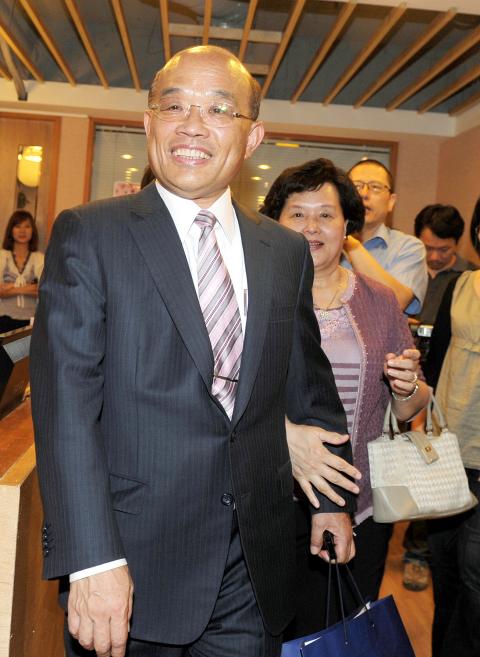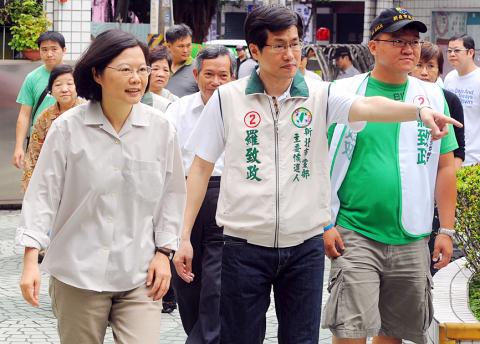Former premier Su Tseng-chang (蘇貞昌) yesterday became the new chairman of the Democratic Progressive Party (DPP), easily beating his four opponents in a race that could have a major impact on the future direction of the party.
Su obtained 50.47 percent of the vote by 163,808 registered members, with former Tainan County commissioner Su Huan-chih (蘇煥智) coming a distant second, with 21.02 percent.
The 64-year-old will serve as the DPP chairperson for the second time, after a brief stint between February and December 2005.

Photo: CNA
Su Tseng-chang, who was regarded as the front-runner from the outset, now has to live up to his pledge in election-eve advertisements in local dailies calling for party unity as the DPP faces major mayoral and commissioner elections in 2014 and a presidential election in 2016.
The turnout rate of 68.62 percent — an all-time high for the party — was better than the expected 50 percent, the DPP said.
A total of 240 polling stations for four elections were set up around the nation between 8am and 4pm.

Photo: Wang Min-wei, Taipei Times
In addition to a new chairperson, party members selected regional office directors and regional and national representatives.
Despite the election being described as a “four-on-one battle against Su [Tseng-chang]” televised vote counting results showed that he pulled away early.
Former chairperson Tsai Ing-wen (蔡英文), who resigned in March following her loss in the Jan. 14 presidential election, cast her vote in Yonghe District (永和), New Taipei City (新北市), in the morning and said that organizational work at the grassroots level would be crucial for the new party boss.
Former vice premier Wu Rong-i (吳榮義) was third with 16,315 votes, or 14.73 percent, while former DPP legislator Chai Trong-rong (蔡同榮) and former DPP chairperson Hsu Hsin-liang (許信良) ranked fourth and fifth, receiving 11.28 percent and 2.49 percent respectively.
Hsu, who is on a hunger strike over three appeals to President Ma Ying-jeou (馬英九), was taken to a polling station by an ambulance yesterday morning.
Hsu told reporters that the DPP should revive the spirit of protest from its early era regardless of who is elected chairperson, or there would be no one to monitor the president.
Acting DPP Chairperson Chen Chu (陳菊) said she hoped that the new chairperson would be able to “handle the cross-strait exchange issue appropriately” and help the party regain its confidence.
The handover ceremony will be held on Wednesday.
At a press conference last night, Su Tseng-chang said the high turnout in the vote made this a win for the whole party.
Ma, acting in his capacity as Chinese Nationalist Party (KMT) chairman, sent Su Tseng-chang flowers to congratulate him on his victory yesterday.
Asked if he would meet Ma to increase cross-party dialogue, Su Tseng-chang said such efforts should be made if it meant improving the lot of the people, but that if such a meeting were just for show, he would decline.
Candidates who were close to Tsai secured important and symbolic victories in regional director elections, with Lo Chih-cheng (羅致政) scoring a surprise victory over Chang Hung-lu (張宏陸), a Su Tseng-chang confidant, in New Taipei City, and Chuang Ruei-hsiung (莊瑞雄) winning a three-way battle in Taipei.

DAREDEVIL: Honnold said it had always been a dream of his to climb Taipei 101, while a Netflix producer said the skyscraper was ‘a real icon of this country’ US climber Alex Honnold yesterday took on Taiwan’s tallest building, becoming the first person to scale Taipei 101 without a rope, harness or safety net. Hundreds of spectators gathered at the base of the 101-story skyscraper to watch Honnold, 40, embark on his daredevil feat, which was also broadcast live on Netflix. Dressed in a red T-shirt and yellow custom-made climbing shoes, Honnold swiftly moved up the southeast face of the glass and steel building. At one point, he stepped onto a platform midway up to wave down at fans and onlookers who were taking photos. People watching from inside

MAKING WAVES: China’s maritime militia could become a nontraditional threat in war, clogging up shipping lanes to prevent US or Japanese intervention, a report said About 1,900 Chinese ships flying flags of convenience and fishing vessels that participated in China’s military exercises around Taiwan last month and in January last year have been listed for monitoring, Coast Guard Administration (CGA) Deputy Director-General Hsieh Ching-chin (謝慶欽) said yesterday. Following amendments to the Commercial Port Act (商港法) and the Law of Ships (船舶法) last month, the CGA can designate possible berthing areas or deny ports of call for vessels suspected of loitering around areas where undersea cables can be accessed, Oceans Affairs Council Minister Kuan Bi-ling (管碧玲) said. The list of suspected ships, originally 300, had risen to about

A Vietnamese migrant worker yesterday won NT$12 million (US$379,627) on a Lunar New Year scratch card in Kaohsiung as part of Taiwan Lottery Co’s (台灣彩券) “NT$12 Million Grand Fortune” (1200萬大吉利) game. The man was the first top-prize winner of the new game launched on Jan. 6 to mark the Lunar New Year. Three Vietnamese migrant workers visited a Taiwan Lottery shop on Xinyue Street in Kaohsiung’s Gangshan District (崗山), a store representative said. The player bought multiple tickets and, after winning nothing, held the final lottery ticket in one hand and rubbed the store’s statue of the Maitreya Buddha’s belly with the other,

Japan’s strategic alliance with the US would collapse if Tokyo were to turn away from a conflict in Taiwan, Japanese Prime Minister Sanae Takaichi said yesterday, but distanced herself from previous comments that suggested a possible military response in such an event. Takaichi expressed her latest views on a nationally broadcast TV program late on Monday, where an opposition party leader criticized her for igniting tensions with China with the earlier remarks. Ties between Japan and China have sunk to the worst level in years after Takaichi said in November that a hypothetical Chinese attack on Taiwan could bring about a Japanese